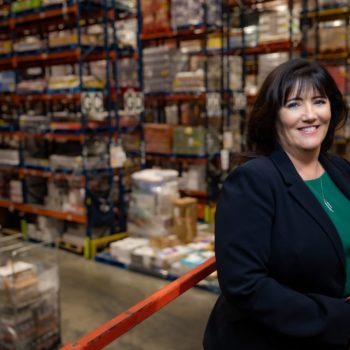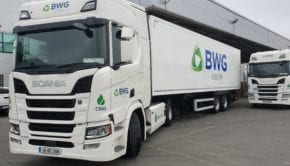BWG becomes first FMCG group to launch fleet of Biogas delivery vehicles in Ireland

Group partners with Irish start-ups in transformative green transport solution
2 July 2020
BWG Foods has become the first FMCG group in Ireland to launch a fleet of biogas powered vehicles as part of the implementation of its ambitious sustainability strategy.
BWG Foods, owners and operators of the Spar, Eurospar, Londis, Mace and XL brands, has launched an initial fleet of two heavy goods delivery vehicles (HGVs) fuelled with biogas in place of traditional diesel fuel, with ambitions to further increase the use of biogas as part of their increasingly environmentally-friendly fuel mix. The vehicles will deliver a 90% reduction in transport related carbon emissions.
Investment in green transport
The launch of the biogas rigid 26 tonne fuelled trucks with electric fridge units, which each cost in the region of €180,000, follows a partnership between BWG and two Irish start-ups – VisionGreen and Generation Green – and represents the most significant development within green transport in Ireland this year.
The trucks are the most efficient transport vehicles across the sector and are also the quietest, meaning less noise pollution across towns and city centres. The first two of BWG Foods’ biogas fuelled trucks will lead to a reduction of 200 tonnes of carbon emissions annually by the business.
In addition to the launch of its fleet, BWG will also contribute food waste from its 240,000 sq ft national distribution centre at Kilcarbery to the biogas production site at Nurney, County Kildare, making this a circular solution.
CNG powered trucks
In the last 12 months, the group has invested heavily in sustainability measures to lower the carbon footprint of its delivery operations and currently has the largest fleet of compressed natural gas (CNG) powered trucks in operation in Ireland, with plans to increase this from 18 to 50 by 2025.
Each of BWG Foods’ CNG trucks complete approximately 120,000 kilometres annually, saving 100 tonnes of Co2 emissions in the process, an average of 15 tonnes per truck. As part of its ambitious investment programme, BWG has plans to gradually increase the use of biogas fuel across its entire fleet of CNG trucks as production of the fuel increases.
Future fuel of choice
Biogas, which is produced by the natural breakdown of food and sewage waste, has been designated as a ‘Future Fuel of Choice’ by the Irish government with greater investment and incentives planned for the increased production of biogas in Ireland. It is also the fuel of choice for BWG Foods into the future given sufficient availability and supports.
Joanne Mellon, logistics director at BWG Foods, highlighted the focus the group places on sustainable solutions, stating: “We at BWG are very passionate about finding new solutions that can reduce our environmental impact and given the significant scale of our business, and the expansive supply chain operation that supports it, it is critically important that we invest in new technologies that allow us to pioneer less carbon intensive methods of delivery.
“We believe that Biogas trucks are the answer to achieve immediate Co2 reductions, as electric and hydrogen HGVs are in their infancy and won’t be available in the Irish market for some time to come,” Mellon added. “It’s been an exciting process working with two Irish companies, VisionGreen and Generation Green, in the development of a solution that has the potential to transform the logistics industry in a very positive way.”
John Pakenham, director at Vision Green said its aims is to support the business sector to make more sustainable choices. “With greater planning and investment, Ireland has huge potential for developing renewable gas,” Pakenham said. “We have partnered with the only existing producer, Green Generation in Nurney Kildare, to bring this pilot to life, to help demonstrate the benefits of renewable gas as a transport fuel.”
CO2 emission savings
As part of its wider supply chain sustainability programme, BWG Foods has also implemented a number of operational efficiency projects that have already led to collective CO2 emission savings of 3,200 metric tonnes per year for the last four years. This included a re-routing programme which led to the reduction of more than 2.3 million kilometres travelled annually and an increase of individual delivery vehicle capacity by 15%. The business also introduced double deck trailers to reduce the number of journeys being made.
BWG Foods’ award-winning logistics division is amongst the largest in the country with operations in 25 locations with collective distribution space of over 1,000,000 sq ft and 280 vehicles in operation. The group has achieved Gold Standard in the FTA Trucksafe programme which audits, reviews and documents fuel efficiencies within the commercial sector, providing data that facilitates a reduction in fuel consumption.



 Print
Print




Fans 0
Followers